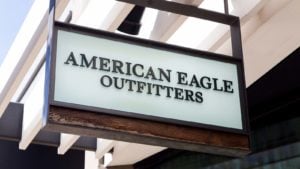The sluggishness in retail sales signals it’s time to assess retail stocks to sell.
U.S. retail figures came in flat last month compared to March, significantly behind analyst estimates. Moreover, retail sales, excluding automobiles and fuel, dipped 0.1%, while a notable 1.2% decline in online sales pointed to a pullback in consumer activity. This worrying trend points to deeper economic headwinds, impacting household budgets by eating into disposable income. Hence, these worrying indicators and ongoing financial uncertainties paint a cautionary picture for retail stocks. With that in mind, here are three retail stocks to sell, offering little to no upside potential.
American Eagle Outfitters (AEO)

American Eagle Outfitters (NYSE:AEO) is one of the top apparel brands, evolving into a trend-focused retailer. Its stellar operating performances, where it beat top-line estimates in seven out of the past eight quarters confirm this. In its most recent quarter, it posted a healthy 5.6% increase in sales while posting a staggering 75% jump in adjusted operating income. These results reflect the company’s refined business strategy, employing a more streamlined merchandise strategy and a focus on women’s athleisure.
On the back of its strong results, we’ve seen a healthy run-up in AEO stock, with it gaining more than 100% in the past year alone. That’s quite a run, and given the current retail scenario it its tough to see it replicate last year’s price action.
Moreover, its business is not without its risks, especially with its heavy reliance on teens and young adults. That demographic is famous for its rapidly evolving tastes which places it in a rough spot with the fickle nature of fashion trends. Furthermore, the intense competition in the athleisure market, a sector dominated by giants such as Lululemon (NASDAQ:LULU), adds another layer of risk.
Leslie’s (LESL)

Leslie’s (NASDAQ:LESL) is a prominent retailer in the pool and spa market, and it is finding it difficult to navigate the post-pandemic environment. During the pandemic years, it witnessed a strong surge in demand, growing its sales from $928 million in 2019 to $1.56 billion in 2022. Home improvement activities increased substantially during the lockdown period, but that trend has reversed. Revenues dropped to $1.45 billion in fiscal year 2023, and analysts expect a further decrease ahead.
Much of it is due to the decline in consumer spending, which is weighing down demand for discretionary items. Additionally, LESL’s revenues are further impacted by heightened price sensitivity among consumers, leading to postponements in equipment upgrades. Additionally, the drop in chemical prices is likely to continue weighing down its near-term operating performance. These headwinds have swept the firm’s financials into the red for the past several quarters, offering little upside in its stock.
Big Lots (BIG)

Big Lots (NYSE:BIG) is an Ohio-based discount retailer that has aggressively expanded to more than a thousand stores globally. However, its rapid ascent came at a steep cost, compounded by tough competition and pandemic-related headwinds.
Hence, we’ve seen it post negative top-line growth dating back to the second quarter (Q2) of 2022. Moreover, its profitability position has dwindled over the past couple of years, with its operating income in the red. Operational expenses have risen healthy, while its top-line growth is at a negative 13.65%.
Its lackluster results also link to store closures stalling sales growth for the firm. In the fourth quarter (Q4), the company shut down 39 stores but opened only three, ending the quarter with 1,392 outlets. By closing more stores than it opens, Big Lots is contracting its market reach. Consequently, Wall Street analysts expect a hefty 12% downside in its stock from current price levels.
On the date of publication, Muslim Farooque did not have (either directly or indirectly) any positions in the securities mentioned in this article. The opinions expressed in this article are those of the writer, subject to the InvestorPlace.com Publishing Guidelines
